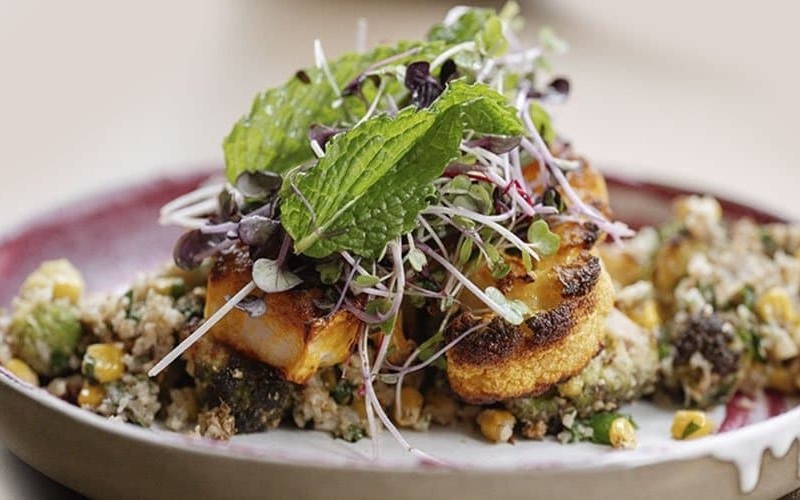Latine Cuisine’s Plant-Based Revolution: Led by Latina Chefs
Latinos have a natural knack for making plants incredibly delicious. Today, there’s a renewed focus on plant-forward dishes, and this shift is putting pioneering Latina chefs and restaurateurs in the spotlight.

When it comes to Latine cuisine, it’s often characterized by its broad spectrum of flavors and ingredients, including succulent meats, protein-rich legumes, and the creamy delight of cheeses. This palette of tastes creates a culinary experience that’s diverse, indulgent, and inherently satisfying. However, the tapestry of Latine cooking has always been more multifaceted than it appears, with a history steeped in an array of plant-based meals.
Today, a renewed emphasis on these plant-forward traditions is emerging, shining a spotlight on the plant-based dimension of Latine cuisine. This evolving landscape is placing pioneering Latina chefs and restaurateurs center stage, as they bring a fresh approach to our time-honored culinary heritage.
While this trend may seem modern, it is deeply rooted in our culinary history. Latin American cooking has always made significant use of fruits, vegetables, grains, and legumes, creating dishes that are naturally rich in flavor and nutrition. Latina chefs today are drawing on these traditions, creating innovative, plant-based reinterpretations of classic dishes and proving that Latine cuisine has always been about more than just meat.
The rise of plant-based diets is a global phenomenon, driven by growing awareness of health, environmental, and animal welfare concerns. While Latin American cuisine, with its array of flavors and ingredients, is perfectly positioned to capitalize on this trend, how are chefs navigating the challenge of honoring tradition while embracing innovation?
Meet the Latina Pioneers in Plant-Based Cuisine
Chef Wendy Garcia, the owner and chef of Tumerico and La Chaiteria, based in Tucson, Arizona, has become a beacon for plant-based Latine cuisine. Garcia’s approach to food is not just healthy but also deeply personal and rooted in her upbringing. She takes pride in making everything from scratch and frequently updates her menu based on available local produce. Her dishes, like vegan enchiladas and jackfruit posole, are not just popular among the vegan community, but they also attract those curious about the flavors of plant-based Latine cuisine.
Cecilia Flores, one half of the husband-wife duo behind Coco Verde Vegan, an Afro-Latina vegan catering business in Boston, brings a unique fusion of Latine and soul food to the Boston vegan scene. With their focus on Dominican cuisine, Flores and her team introduce diners to a variety of creative plant-based dishes. Their popular menu items include vegan mofongo and sancocho, showcasing their skill in maintaining the heart and soul of traditional dishes while embracing plant-based ingredients.
Jasmine Hernandez Cecilia, the creative force behind Chicana Vegana in Fullerton, California, is championing a culinary revolution with her plant-based twists on Mexican-American classics. Born and raised in Southern California, Jasmine’s unique culinary perspective blends her Mexican heritage with her passion for veganism. She takes pride in reimagining beloved favorites without compromising on taste or authenticity. Whether it’s her tantalizing vegan ‘Carne’ Asada Fries, ‘Pollo’ Verde Wet Burritos, or Jackfruit ‘Carnitas’ Tacos, Jasmine proves that plant-based alternatives can deliver the same satisfaction and complexity as their traditional counterparts.
What’s Next For Plant-Based Latine Cuisine?
For these culinary innovators, the challenge isn’t just about replacing meat with vegetables—it’s about recreating the distinctive tastes, textures, and aromas that define Latine cuisine. It involves a creative balancing act: honoring the richness of their culinary heritage while meeting the growing demand for plant-based alternatives.
But the rise of plant-based Latine cuisine is about more than just adapting to new dietary preferences. It’s about showcasing the vast potential of Latin American ingredients, many of which are naturally plant-based and rich in flavor. It’s about celebrating the diversity of the Latine culinary tradition, while making it accessible and appealing to a broader audience.
As we look toward the future, these pioneering Latina chefs are showing us that tradition and innovation can coexist harmoniously on a plate, redefining our perceptions of Latine cuisine and opening our palates to exciting new flavors. Join us as we explore this burgeoning culinary frontier, one delicious, plant-based dish at a time.




